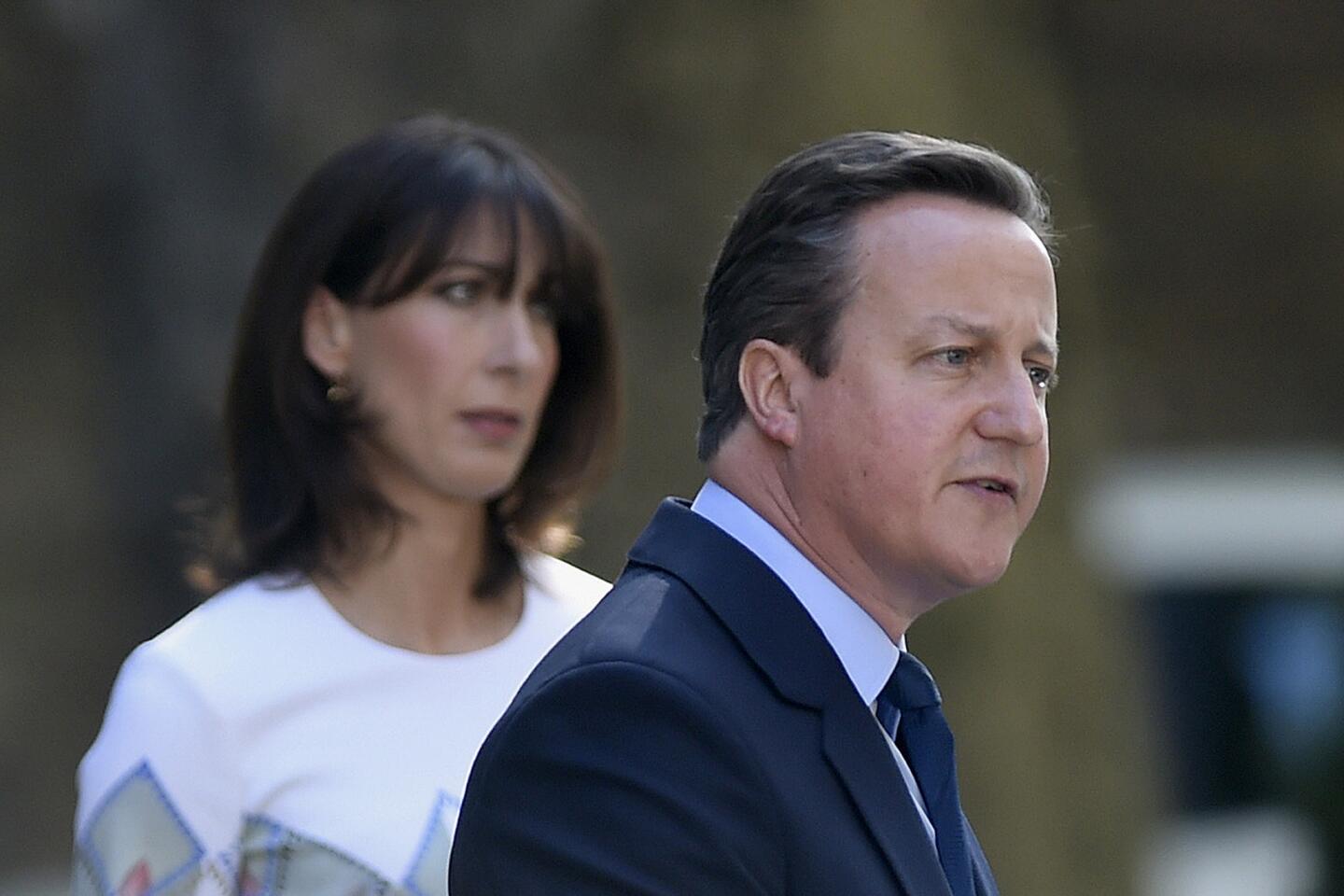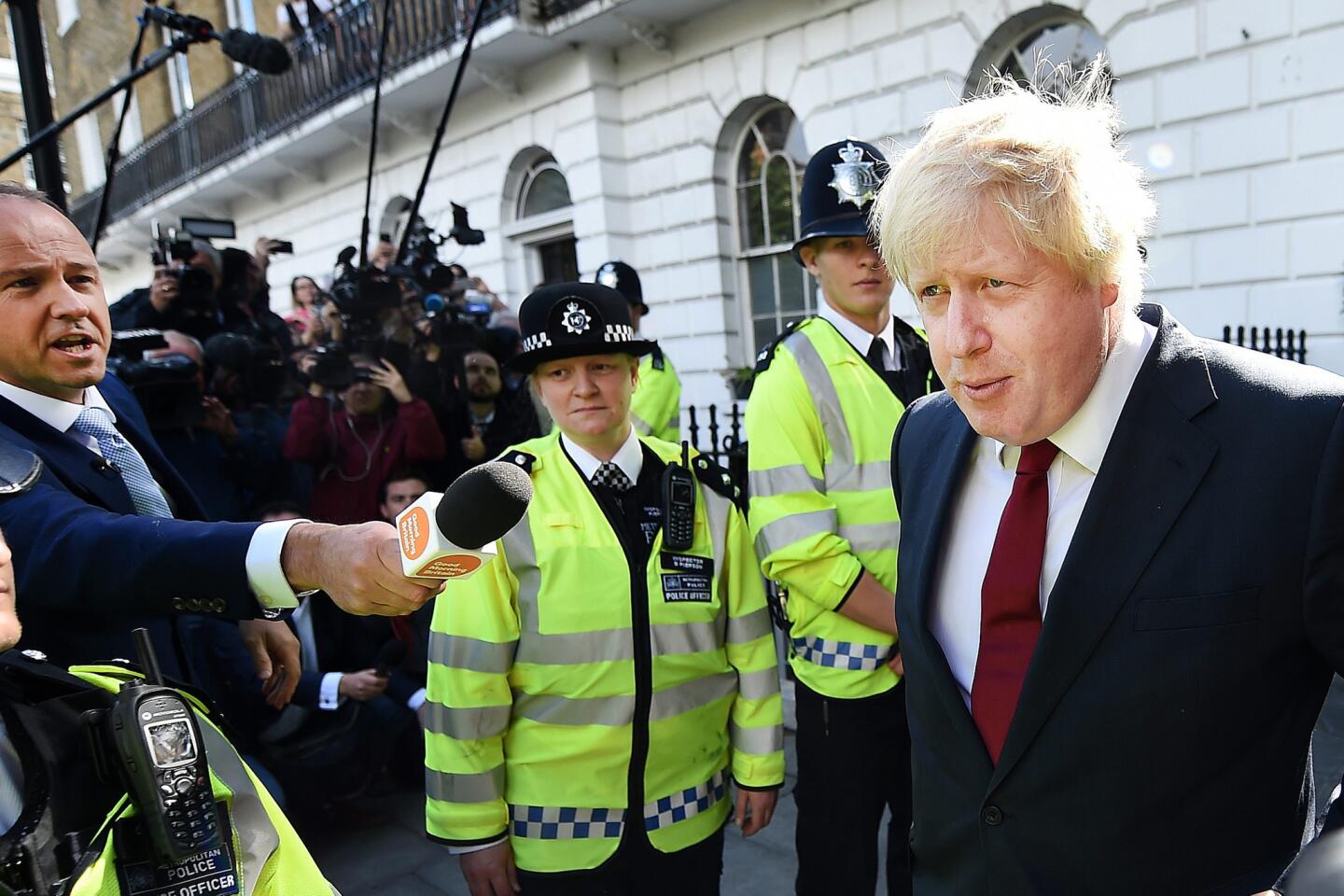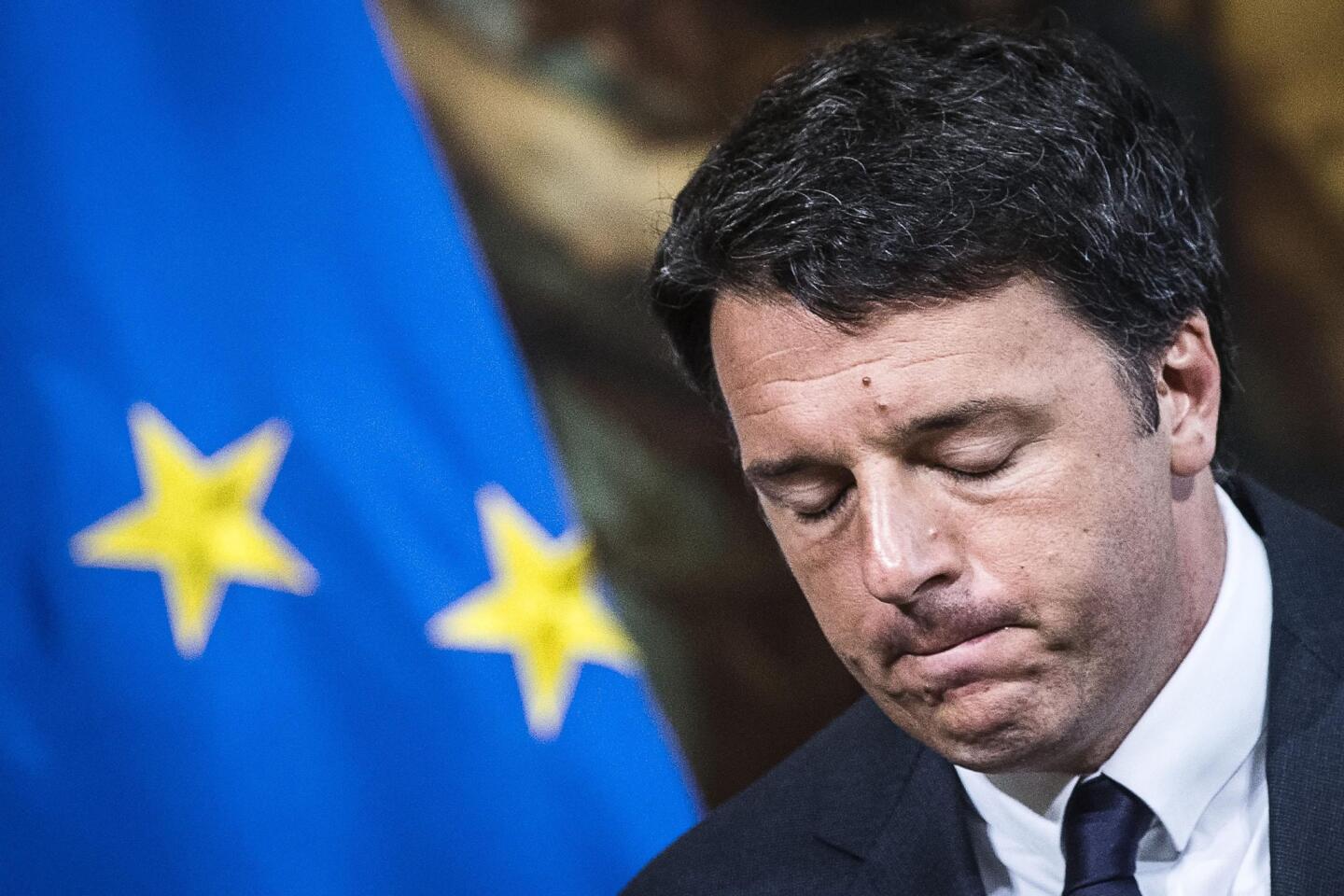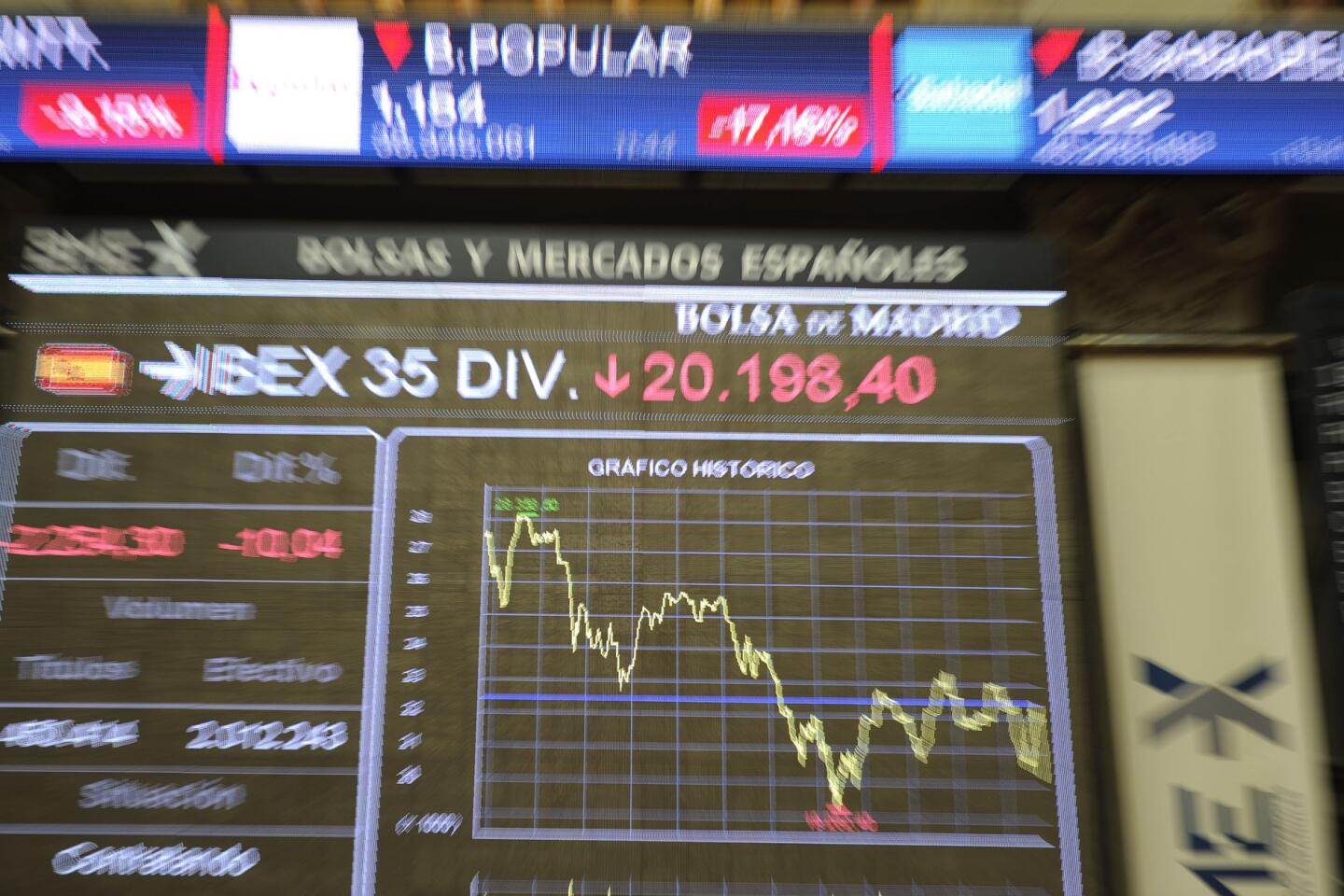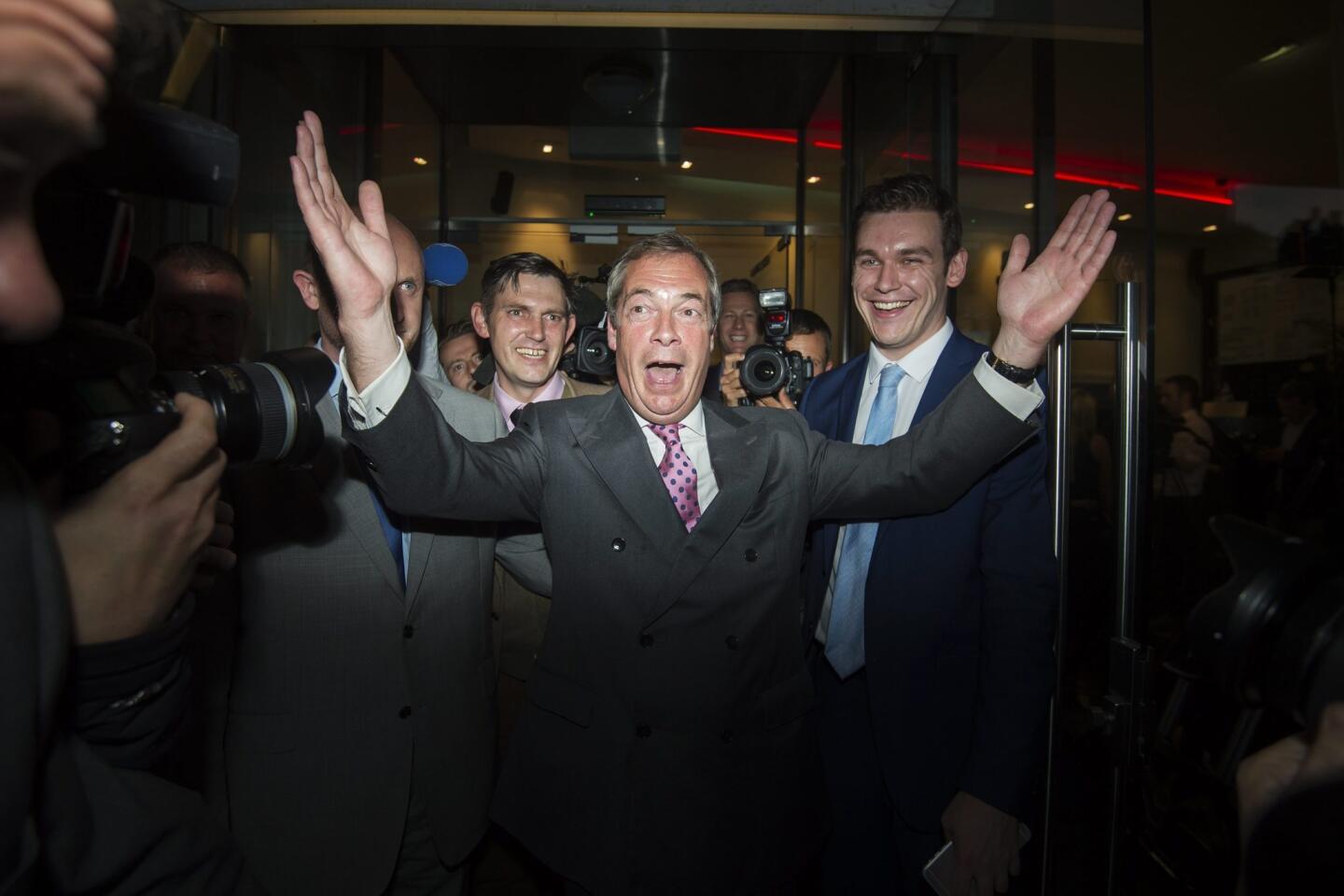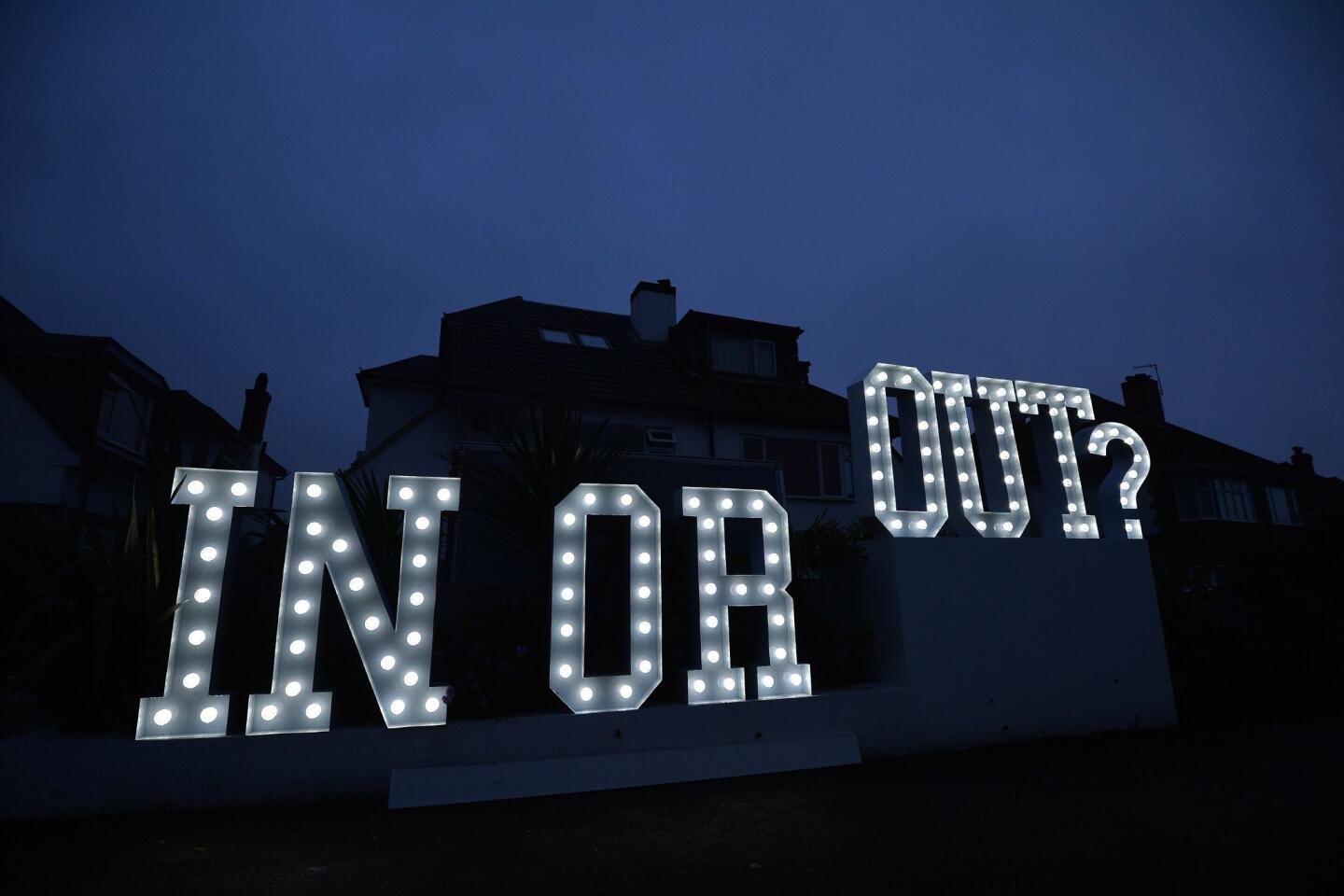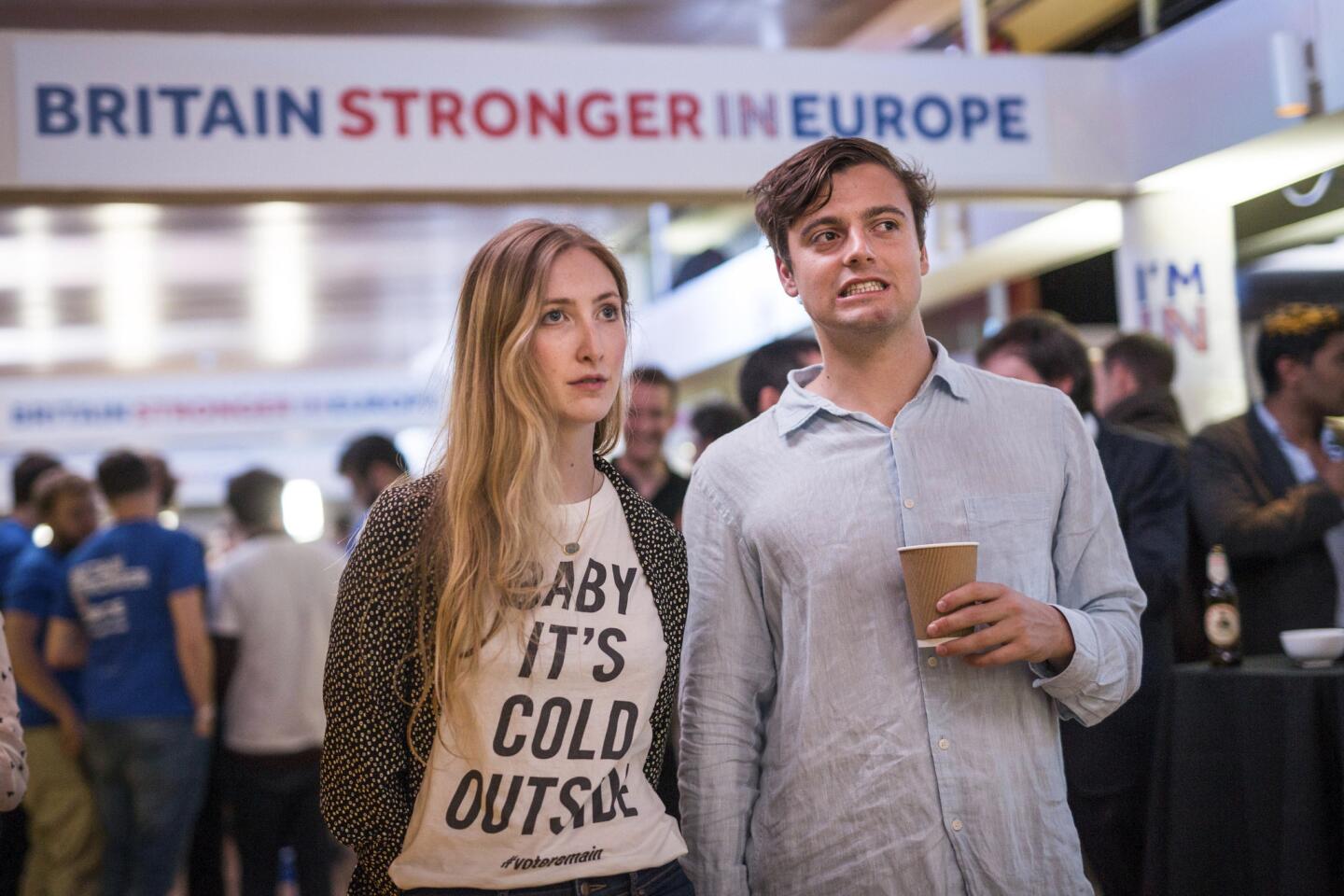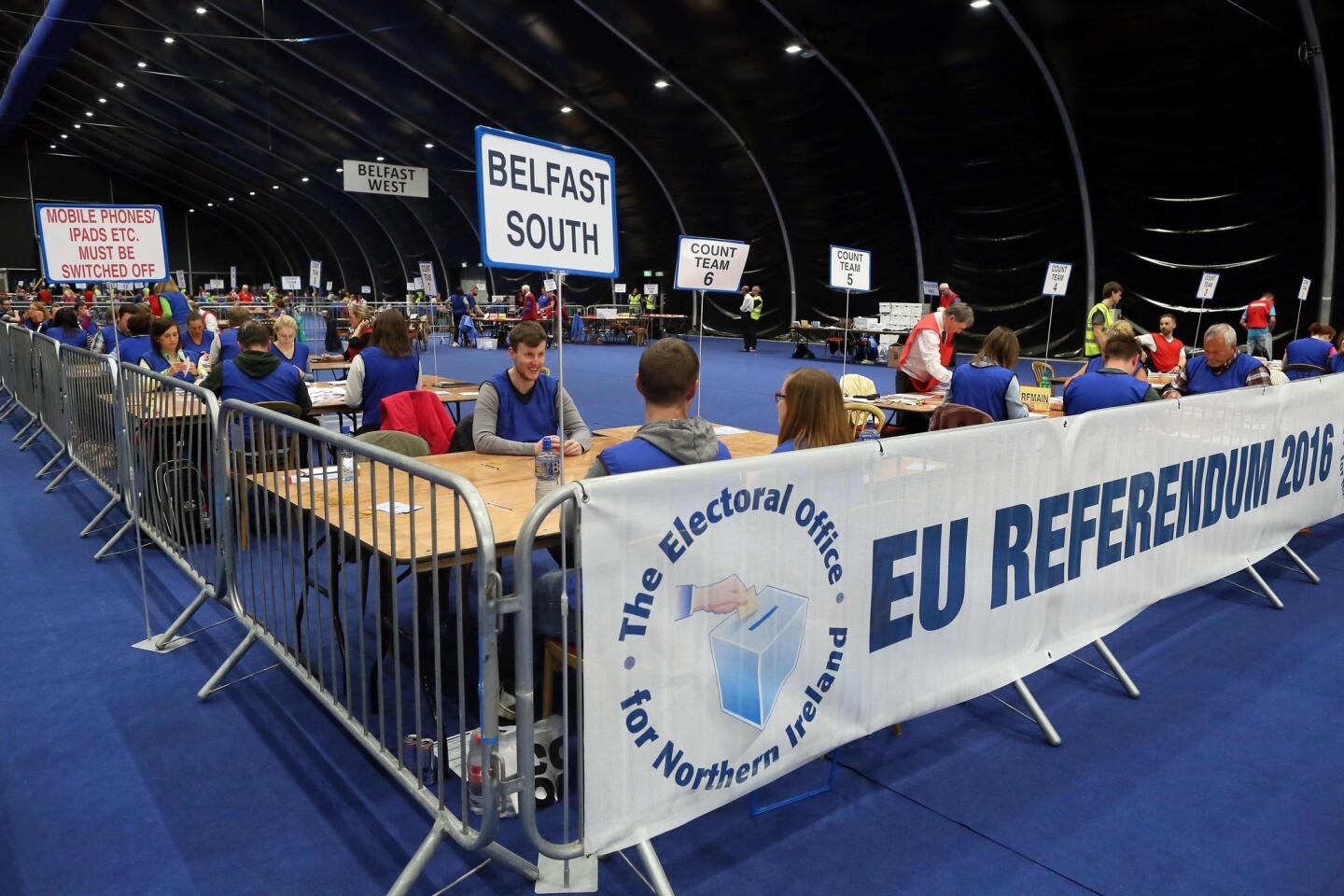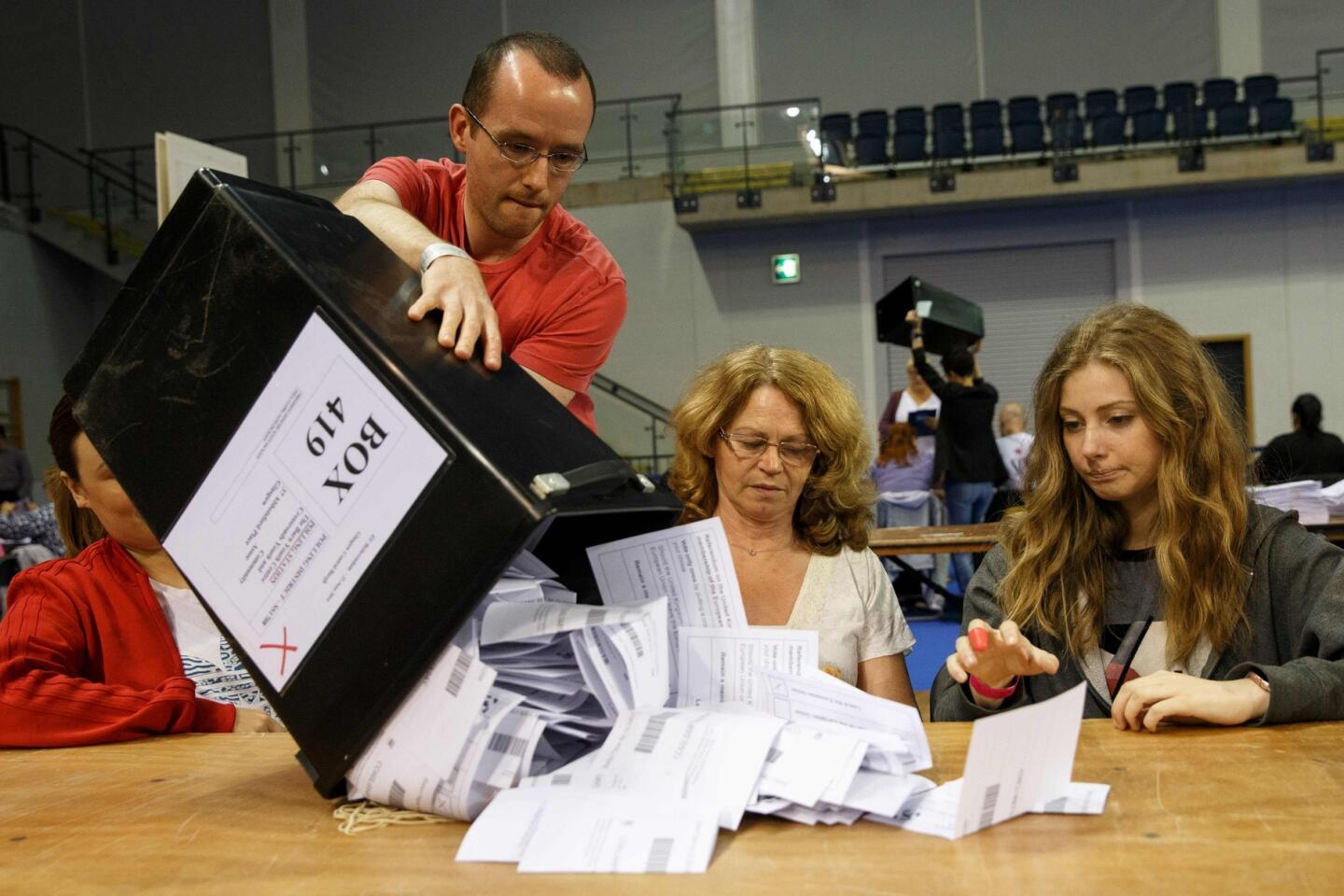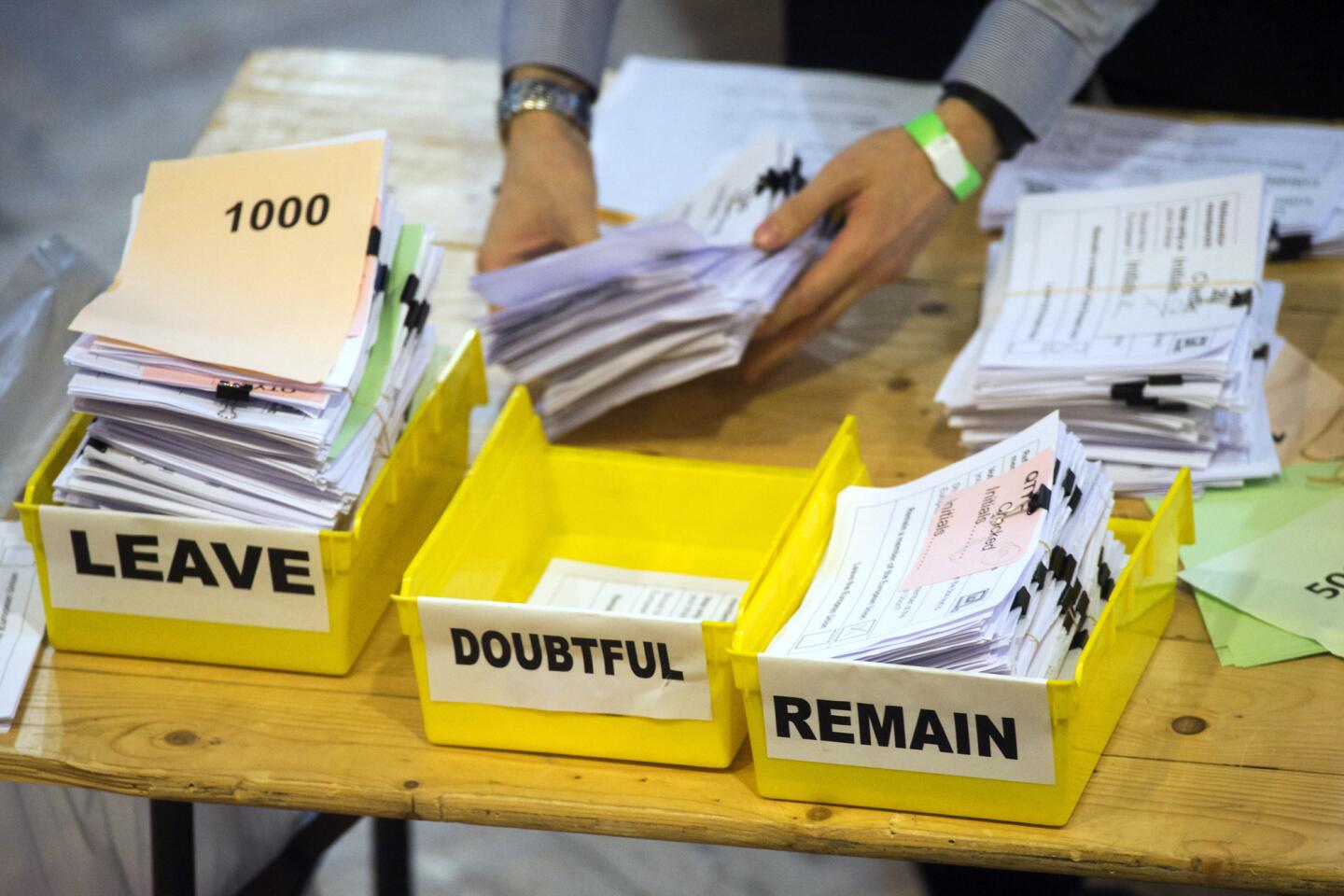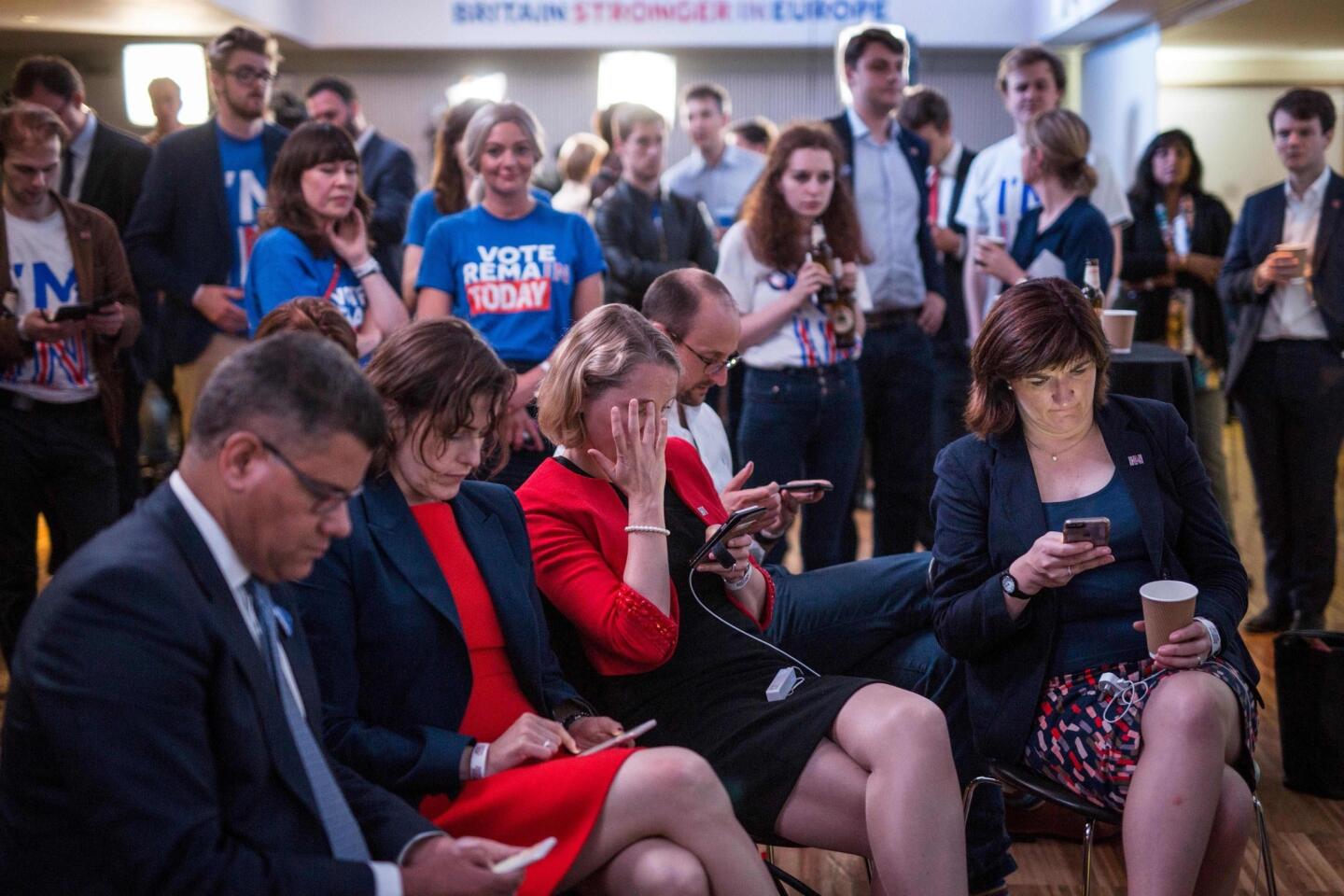British Prime Minister David Cameron says he will step down after historic vote to leave European Union
Reporting from London — Britons voted Thursday to leave the 28-nation European Union, a historic vote that sent shock waves across the continent and prompted Prime Minister David Cameron to announce that he will step down by October.
“The will of the British people is an instruction that must be delivered,” Cameron said after voters decided, by a 52-48% margin, to quit the union that created a continent-wide economy and strived to ensure that Europe never again is engulfed by conflict like the two world wars of the 20th century.
Cameron, the Conservative Party leader who has led Britain for the last six years and who campaigned vociferously to remain in Europe, said it was time for “fresh leadership” to determine how and when to launch the process of dividing from Europe.
Updates: Britain votes to leave European Union>>
“I do not think it would be right for me to be the captain who steers the country to its next destination,” said Cameron, signaling that he will step down at the time of his party’s annual conference in October.
Throughout Europe, people awoke Friday to the news that British voters had decided to quit the EU, which many believed was encroaching on their sovereignty and opening borders to too many immigrants.
Reaction was swift. The pound dropped to a low not seen since 1985, and Asian markets were thrown into turmoil.
Donald Tusk, the European Council president, vowed to stay the course -- but with 27 countries, not 28. “Europe is not only a fair-weather project,” he said.
“It’s true that the past years have been the most difficult ones in the history of our union, but I always remember what my father used to tell me, what doesn’t kill you makes you stronger,” Tusk said.
The governor of the Bank of England, Mark Carney, said “extensive contingency planning” and substantial assets on hand have left the British banking system prepared for any future transition or market turbulence.
“To be clear, the Bank of England will not hesitate to take additional measures as required, as markets adjust and as the U.K. economy moves forward,” he said.
The vote showed Britain to be sharply divided geographically, with a strong pro-EU vote in London, Scotland and Northern Ireland, and majorities for leaving in much of the rest of the country.
“Dare to dream that the dawn is breaking on an independent United Kingdom,” UK Independence Party leader Nigel Farage said to a cheering crowd at what turned into a “leave” victory party.
“This will be a victory for real people, a victory for ordinary people, a victory for decent people,” he added. “I hope this victory brings down this failed project, and leads us to a Europe of sovereign nation states trading together, being friends together, cooperating together — and let’s get rid of the flag, the anthem, Brussels and all that has gone wrong.”
Farage’s fellow “leave” campaigner Don Hannan was equally ebullient, but said that with 48% of Britons voting to stay in Europe, “we need, wherever possible, to try to build consensus.” He added that the result did not mean that Britain would be “walking away from our friends in Europe.”
The British pound — Britain had never adopted the euro — plummeted more than 10% in six hours on international currency markets, from about $1.50 to below $1.35. Many economists had predicted that an EU exit would hurt the British economy and undermine London’s position as a global financial center.
There were reports that turnout was lower than expected in some of the areas most committed to staying in the European Union — in particular, Scotland, where voters overwhelmingly opposed leaving the union.

Britons voted Thursday to leave the 28-nation European Union, a historic vote that sent shock waves across the continent.
The vote promised political, economic and social changes for Britain and the EU member nations as well as global ramifications. Supporters say Britain would be in a better financial position, but opponents say the potential problems outweigh any benefits.
Cameron took much of the blame from opponents of the referendum for opening the door to the vote and from supporters for backing the wrong side.
David Jones, a Conservative member of Parliament from Wales who supported the “leave” campaign, told the BBC that Cameron had been a strong prime minister, but, “the fact is, on this occasion, he called it wrong.”
“Harry Potter” author J.K. Rowling, who supported staying in the EU, wrote on Twitter that Scotland was now likely to vote to leave Britain, after having voted in 2014 to stay. “Cameron’s legacy will be breaking up two unions,” she wrote. “Neither needed to happen.”
Cameron, speaking outside Downing Street, called on the country to support the will of the majority and help the country through the coming measures to carry it out.
“The country has just taken part in a giant democratic exercise, perhaps the biggest in our history,” he said. “We should be proud of the fact that in these islands, we trust the people with these big decisions.”
The Liberal Democrat leader, Tim Farron, said he was heartbroken.
“I am devastated and I am angry,” he said. “Today we wake to a deeply divided country. Nigel Farage’s vision for Britain has won this vote, but it is not a vision I share. Young people voted to remain by a considerable margin, but were outvoted. They were voting for their future, yet it has been taken from them.”
A newscaster on ITV television reported “near total silence” at a “remain” campaign party.
Earlier in the day, despite rainy and gray weather, there was a long line of people waiting to vote at Gospel Oak Methodist Church in north London, which was not the case last month for the London mayoral election.
“I think this referendum is really important,” said Anna Solemani, wearing a “remain” sticker on her rain slicker. “I want to stay in, and this is the most passionate I have ever been for an election or referendum.”
In the London neighborhood of Chelsea, pensioner Jo Davis said she voted to leave because she thinks “we have had such a muddle with immigration.”
The formation of the EU began after World War II to generate economic cooperation and avoid war. The debate on whether it was time for Britain to break away generated fears about uncontrolled immigration and other problems if the “remain” camp won and a virtual economic collapse if the “leave” camp won.
See more of our top stories on Facebook >>
Britain will have about two years to negotiate its exit strategy.
Jean-Claude Juncker, the European Commission president, had warned in advance that there would be no further negotiations of the country’s relationship with the EU if British voters decided to leave. “Out is out,” he said.
The referendum has been a highly contentious issue for months, with both sides claiming their statistics and predictions are correct and accusing the other side of inaccuracies and lies. The BBC even set up a “Reality Check” page on its news website in a bid to fact-check all the claims made by both sides.
The campaign experienced tragedy last week as lawmaker Jo Cox, a “remain” supporter, was killed by a man who reportedly shouted, “Britain first,” before shooting and stabbing the 41-year-old mother of two. Britain First, a far-right political group, denied any involvement in the slaying.
The vote to leave the EU means Britain will have to renegotiate its relationship with the countries still in the partnership and other nations. The “leave” camp, headed by former London Mayor Boris Johnson -- now considered a potential successor to Cameron -- said Britain would be better off financially because all the money the country contributes to the EU would remain in British coffers and could help boost the internal economy.
Those in the “remain camp -- led by Cameron and supported by former prime ministers Tony Blair and John Major -- had maintained that leaving would have negative effects on long-term economic growth, housing prices, jobs and the general standard of living.
The two most contentious issues tied to the referendum were immigration and the economy.
Britain is part of the single EU market, which means no trade tariffs on imports and exports within the union. If voters decide to leave, trade deals with EU countries and others such as the U.S. would need reworking. President Obama said on a visit to London in May that if “Brexit” passed, the country would be put “in the back of the queue” when it came to trade deals. Experts believe that France, Belgium and possibly Germany would reject any moves by Britain to remain within the European single market without at least an agreement that European citizens could continue to work and live in the country.
The immigration issue largely stems from the number of European Union citizens who have come to live and work in Britain and can collect benefits.
The “leave” argument has been that people from poorer countries have flooded Britain during the last several years and Britain has lost control of its borders. According to the Office of National Statistics, net migration to the country was 330,000 in 2015, with 184,000 coming from within the EU.
The “remain” camp countered that EU migrants contribute to the growth of the country and many work in jobs that many British citizens do not want, including as builders, cleaners and nannies.
“As it happens, if we left the EU, nothing would change in terms of our international obligations towards refugees,” said Robert Hazell, a professor of government and constitution at University College London.
MORE
‘Brexit’ shock waves rock Germany and the rest of Europe
U.S. markets drop sharply after ‘Brexit’ vote increases global recession risk
Editorial: Brexit would be a disaster for Britain
More to Read
Sign up for Essential California
The most important California stories and recommendations in your inbox every morning.
You may occasionally receive promotional content from the Los Angeles Times.
